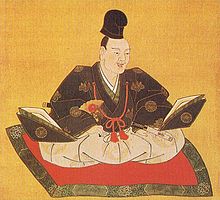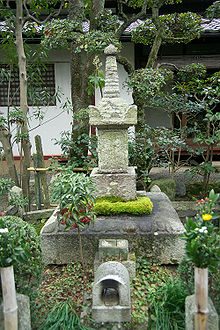- Minamoto no Yoshinaka
-
Minamoto no Yoshinaka (源 義仲, 1154 – March 4, 1184) was a general of the late Heian Period of Japanese history. A member of the Minamoto samurai clan, Minamoto no Yoritomo was his cousin and rival during the Genpei War between the Minamoto and the Taira clans.
Born in Musashi province, Yoshinaka's father Minamoto no Yoshikata was killed and his domain was seized by Minamoto no Yoshihira in an intrafamily feud while he was still an infant. Yoshihira sought to kill Yoshinaka also, but he escaped into the care of Nakahara clan in Kiso, Shinano Province (present-day Nagano Prefecture) where he was then raised. He was raised with Nakahara Shiro who was his milkbrother (Shiro's mother Chizuru nursed Yoshinaka and Shiro). This Shiro would later become Imai no Shiro Kanehira, Yoshinaka's best friend and most loyal retainer. Yoshinaka later changed his name from Minamoto to Kiso.
In 1180, Yoshinaka received Prince Mochihito's call to the members of the Minamoto clan to rise against the Taira. Yoshinaka entered the Genpei War raising an army in Shinano and quickly conquered the province. In 1181, Yoshinaka sought to regain his father's domain in Musashi which was already under the control of his cousin Minamoto no Yoritomo. The two reconciled and resolved to not fight one another but Yoshinaka had to accept Yoritomo as the leader of the Minamoto clan, give up his aspirations for his father's domain, and send his son Yoshitaka to Kamakura as a hostage. However, having been shamed, Yoshinaka was now determined to beat Yoritomo to Kyoto, defeat the Taira on his own, and take control of the Minamoto for himself.
Yoshinaka defeated the army of Taira no Koremori at the Battle of Kurikara Pass and marched to Kyoto. The Taira retreated out of the capital, taking the child Emperor Antoku with them. Three days later Yoshinaka's army entered the capital and the cloistered Emperor Go-Shirakawa bestowed upon him the title of Asahi Shogun. However, his army ransacked Kyoto, and the emperor ordered him to attack the Taira in order to get the army out of the capital.
Later, returning to Kyoto after a battle, Yoshinaka was angered to find out that the Emperor had sided with his cousin Yoritomo. He extended military control over the city, pillaging it and imprisoning the Emperor Go-Shirakawa, and forced the Emperor to bestow upon him the title of shogun. Minamoto no Yoritomo, angry at Yoshinaka's actions, ordered his brothers Minamoto no Yoshitsune and Minamoto no Noriyori to attack and kill Yoshinaka.
Yoshinaka was driven out of Kyoto and killed by his cousins at the Battle of Awazu in Ōmi Province (present-day Shiga Prefecture) along with his milk brother Kanehira. With night coming and with many enemy soldiers chasing him, he attempted to find an isolated spot to kill himself. However, the story says that his horse became trapped in a field of partly frozen mud and his enemies were able to approach him and kill him.
He was buried in Otsu, in Ōmi; a temple was built his honor during the later Muromachi period. Its name, Gichū-ji, has the same two kanji as his given name. Kanehira's grave is also in Otsu, but it is not close to Yoshinaka's. The Edo period poet Matsuo Bashō, pursuant to his last wishes, was buried next to Minamoto no Yoshinaka in Gichū-ji.
Minamoto no Yoshinaka is one of many main characters in the Kamakura period epic, the Tale of Heike. The story of Yoshinaka and Kanehira is fairly well known in Japan; it is also the subject of the Noh play "Kanehira", in which Kanehira's tormented ghost describes his and Yoshinaka's death, and his wish to go to the other side.
Additional reading
- Yoshinaka's life is described in some detail in S. Turnbull's book The Samurai (1977) pages 55 to 66).
Categories:- Minamoto clan
- Shoguns
- 1154 births
- 1184 deaths
- People of Heian period Japan
Wikimedia Foundation. 2010.


